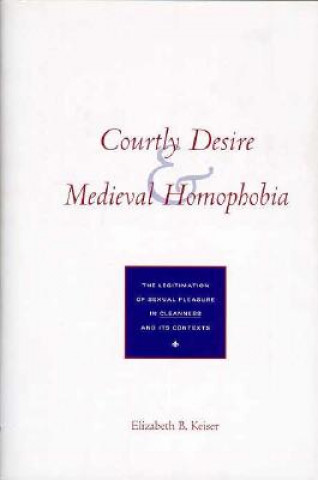
Doručení
Nákupní rádce





Nehodí se? Vůbec nevadí! U nás můžete do 30 dní vrátit
 Dárkový poukaz
V libovolné hodnotě
Dárkový poukaz
V libovolné hodnotě
S dárkovým poukazem nešlápnete vedle. Obdarovaný si za dárkový poukaz může vybrat cokoliv z naší nabídky.
Courtly Desire and Medieval Homophobia
 Angličtina
Angličtina
 225 b
225 b
30 dní na vrácení zboží
Mohlo by vás také zajímat


In the first comprehensive study of Cleanness and its medieval contexts, Elizabeth B. Keiser shows how this fourteenth-century religious poem legitimates erotic pleasure as natural apart from procreative justification and thus represents a unique moment in Western culture. She argues that Cleanness sacralizes heterosexual erotic play while condemning male homosexual love as profaning the Creator's workmanship and his nature. To situate the poem in the context of medieval homophobic constructions of nature as the basis of sexual norms, this book compares Cleanness's concepts of sexual desire and deviance with those its literary and theological antecedents, including Thomas Aquinas's discourse on temperance, Alain de Lille's Complaint of Nature, and Jean de Meun's Romance of the Rose. Cleanness is shown to be unconventionally affirmative of loveplay and other refinements of courtly artifice. Keiser explores the broad intellectual and social consequences of this celebration of late medieval masculine ideals and analyzes how the poet's class-specific aesthetic sensibility underlies a theologically and ethically flawed revisionist history of the biblical Creator's love affair with the creation. These limitations shed interesting light on Cleanness's relation to its theologically more complex and structurally more sophisticated companion poems - Patience, Sir Gawain and the Green Knight, and Pearl. This book is of groundbreaking importance for students of medieval literature and religion, the history of sexuality, queer studies, and gender studies.
Informace o knize
 Angličtina
Angličtina




 Jak nakupovat
Jak nakupovat





























